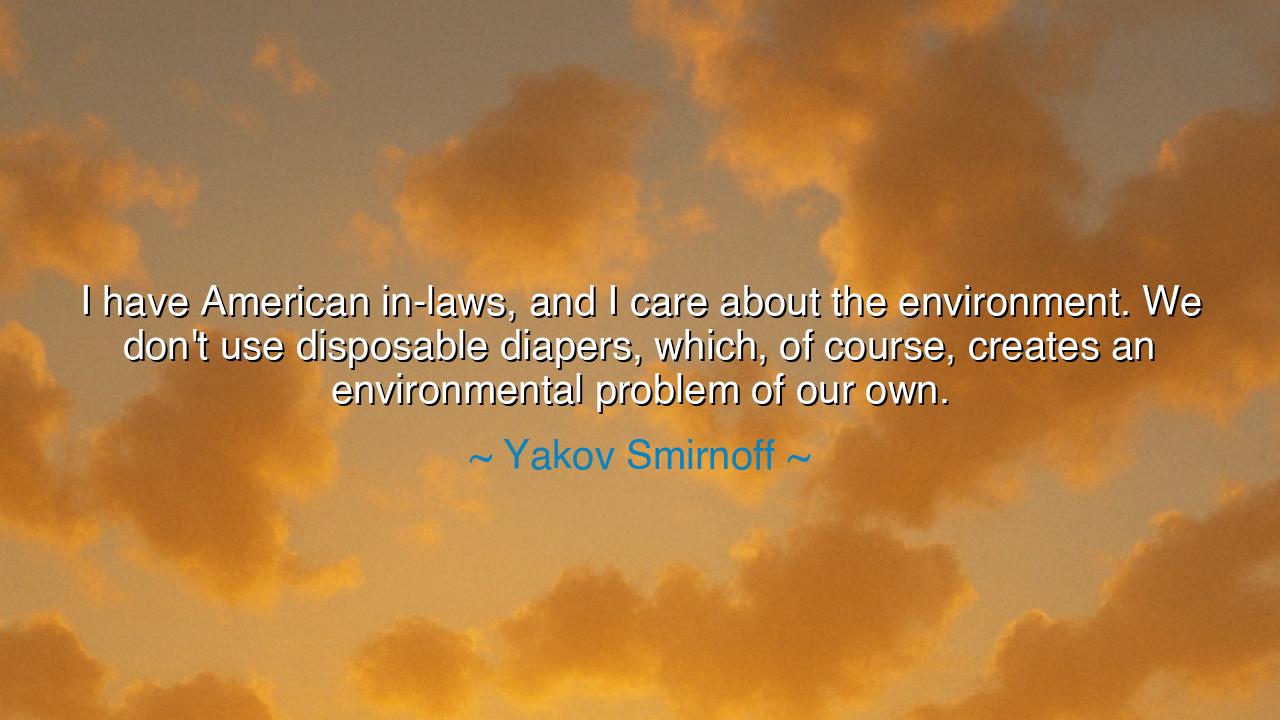
I have American in-laws, and I care about the environment. We
I have American in-laws, and I care about the environment. We don't use disposable diapers, which, of course, creates an environmental problem of our own.






Hear, O listeners, the wry yet wise words of Yakov Smirnoff, who declared: “I have American in-laws, and I care about the environment. We don’t use disposable diapers, which, of course, creates an environmental problem of our own.” At first hearing, these words seem but a jest, light-hearted and playful. Yet hidden within them is a profound teaching, for humor often reveals truths that solemn speech cannot. Here Smirnoff reminds us of the paradoxes of human life: that even in striving for good, we may create new burdens; that every choice carries consequence, whether seen or unseen.
The meaning of his words lies in the tension between intention and outcome. To reject disposable diapers is to resist the mountains of waste they create, filling landfills with plastics that endure for centuries. This is an act of environmental care, a choice born of responsibility. Yet the alternative—cloth diapers, washed endlessly—demands vast water and energy, creating another form of environmental toll. Thus Smirnoff reveals the eternal struggle of humanity: to act rightly is not always simple, and even our noblest efforts may carry unintended costs.
The ancients, too, knew this paradox. In the wisdom of the Greeks, it was said that man is ever caught between competing goods, and must choose with discernment. The Stoics spoke of virtue as walking a narrow path between extremes, knowing that no choice is pure, yet striving always for balance. Smirnoff’s jest is an echo of this truth: there is no perfect solution, only the striving toward lesser harm, the awareness that one’s choices ripple outward upon the earth.
History gives us many such examples. Consider the Industrial Revolution, when machines freed humanity from toil, producing abundance undreamed of by earlier ages. Yet with that liberation came choking smoke, poisoned rivers, and landscapes scarred by mines. The very engines of prosperity also became engines of destruction. Like Smirnoff’s diapers, they solved one problem while birthing another. The lesson is clear: human progress is never without cost, and wisdom lies in measuring that cost honestly, not hiding from it.
The deeper teaching of Smirnoff’s words is humility. He does not claim to have solved the puzzle of sustainable living. Rather, he admits the contradiction openly: “We don’t use disposable diapers… which creates another problem.” Such honesty is rare, for too often we veil our choices in self-righteousness, pretending our way is pure while ignoring its hidden costs. To admit complexity is itself a virtue, for it invites continued striving, learning, and improvement.
The lesson for us is this: in the care of the environment, do not seek perfection, but sincerity. Act with awareness, make choices that lean toward stewardship, and yet recognize the limits of every path. Do not despair when contradictions arise, but let them sharpen your wisdom. For the earth does not need flawless saints, but faithful stewards who learn, adapt, and act with humility.
Therefore, O listener, let Smirnoff’s jest rest heavy upon your heart. In your own life, seek ways to reduce waste, to honor the resources of water, air, and soil. Support innovations that lessen harm, yet never forget that each choice has cost. Let this awareness guide you not into paralysis, but into vigilance and humility. For it is better to strive imperfectly than to abandon the struggle altogether.
So remember: even the smallest act—choosing a diaper, planting a tree, conserving a drop of water—carries meaning. And though every act may birth new challenges, it is in the striving, the humility, and the continual care that true environmental responsibility is found. Thus humor becomes wisdom, and laughter becomes the teacher of truth.






AAdministratorAdministrator
Welcome, honored guests. Please leave a comment, we will respond soon